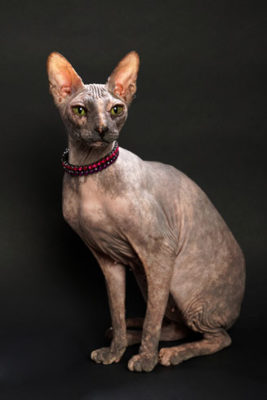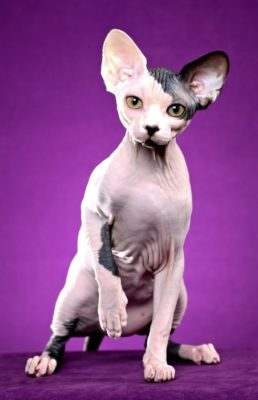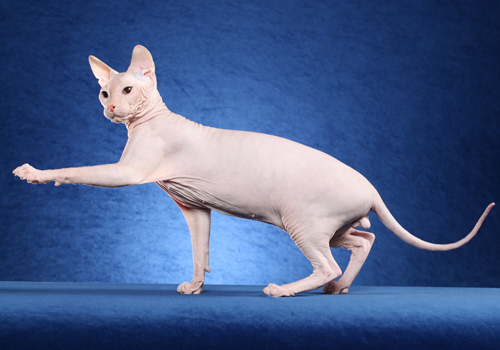Donskoy Cat
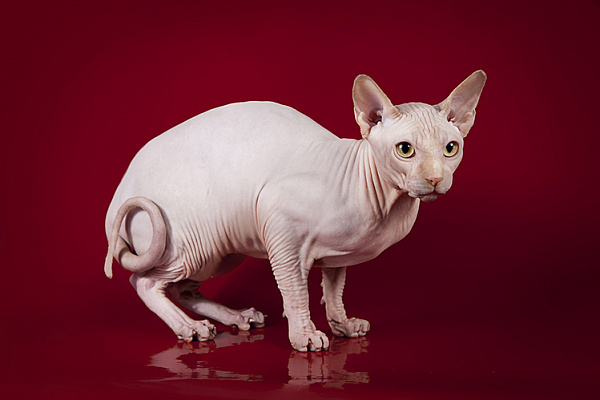
A Donskoy cat is very vulnerable and gentle; jealousy and aggression are not inherent in it. It is a good-natured creature, which is impossible to take out of temper. The cat will get along perfectly with the baby and will tolerate all his antics. The pet is very fond of its owner and demands his attention and affection. In childhood, Don Sphynxes show a lot of activity. Adult cats lead a more measured way of life. They do not hurry anywhere and do not mind taking a nap on the bed or the radiator.
Table of Contents
Breed Information
| Origin | Russia |
| Size | 23-30 cm |
| Weight | Males 4-5.5 kg Females 2.5-4.5 kg |
| Fur Type | Hairless |
| Color | Anyone |
| Lifestyle | Indoors |
| Lifespan | 11-13 years |
| FIFe Classification | Category III: “Short-haired and Somali” Breed designation – DSP |
| WCF Classification | Group 3: “Short-haired” Breed designation – DSX |
| TICA Classification | DH |
| Group | Hairless cats, hypoallergenic cats |
| Price | $1200-2000 |
Breed Photos
Origin History
The breed was bred by chance in Rostov-on-Don. In 1986, Elena Kovaleva took in a homeless girl kitten, whom she named Varvara. Subsequently, she went bald, and various tests revealed no diseases. When Varvara was crossed with another short-haired cat, she received almost hairless offspring. It indicated the presence of a dominant gene.
In 1990, one of the kittens, named Chita, was taken by another breeder, Irina Nemykina. She mated the cat to a European Shorthair cat, but the offspring were not completely bald. Then Chita was mated with her son and finally got hairless kittens. The World Cat Federation (WCF) recognized the new breed in 1997. Eight years later, the pet was recognized by the International Cat Association (TICA).
Appearance
The Don Sphynx is a hairless cat with an unusual appearance. Its body is short and muscular, broad in the croup area. The pet’s head is wedge-shaped with pronounced cheekbones and a convex brow. The muzzle is moderately long; the forehead is wrinkled. The transition from the forehead to the nose is quite marked. The large ears are set high and slanted forward. The cat’s almond-shaped eyes are wide open and slightly oblique.
Don Sphynx limbs are medium length, paws with outstretched toes. The tail is long and flexible with no creases. The animal’s skin is a calling card. It is hot and elastic, going into folds. The wool cover in structure and length comes in four types: naked, flock, velour, and brash. The last one is the hairiest; it is not allowed at exhibitions.
Character
A Donskoy cat is very vulnerable and gentle; jealousy and aggression are not inherent in it. It is a good-natured creature, which is impossible to take out of temper. The cat will get along perfectly with the baby and will tolerate all his antics. The pet is very fond of its owner and demands his attention and affection. In childhood, Don Sphynxes show a lot of activity. Adult cats lead a more measured way of life. They do not hurry anywhere and do not mind taking a nap on the bed or the radiator.
Because of some laziness, cats don’t care about other pets. They will not touch parrots and guinea pigs. Representatives of this breed are quite smart and savvy. They know how to behave with the owner and always feel his mood.
Care
Don’t rush to classify a Donskoy cat as an ideal pet because of its lack of hair. Cats are prone to sweating and may have an unpleasant odor. Their skin secretes a brown substance that needs to be removed. You should bathe your pet at least once every two weeks using a special shampoo for hairless cats. When bathing, keep the temperature at 30-40 degrees. You can also add decoctions of succession or chamomile to the water to help get rid of rashes.
Don Sphynx’s eyes are quite vulnerable due to the lack of eyelashes. They should be washed daily without the use of cotton swabs or disks. If a greenish or yellowish plaque appears in the corners of the eyes, this is why taking your pet to the veterinarian. It is also advisable to clean his ears of wax every week. Long claws do not retract into their pads, so trim them periodically. Several times a month, brush your Don Sphynx’s teeth with a special veterinary toothpaste.
Education
Despite the gentleness of his character, the Donskoy cat often has aristocratic tendencies. Forcing a cat to do something against its will is a useless idea. However, if such a desire arises, it is quite possible to teach the cat commands and tricks.
A wayward pet may have trouble going to the bathroom. It is not uncommon for a cat to do this on the owner’s bed. You can cover it with a plastic blanket and put the animal in its place with a shout and a stream of water. Another pet may object to bathing and clawing. Therefore you should educate the cat from an early age and be strict when necessary.
Common Diseases
The Don Sphynx has poor health. The cat has various skin diseases such as acne, seasonal dermatitis, shingles, nodular cystic acne. The pets also show a tendency to the following eye diseases:
- corneal ulcer;
- conjunctivitis;
- sclerite.
Congenital health problems are not uncommon, for example:
- carp bite;
- microphthalmus;
- curvature and softening of caudal vertebrae;
- nipple hyperplasia.
Nutrition
Feed the Donskoy cat three to four times a day. Give your pet at least 150 grams of lean meat. Beef or chicken will do. Sometimes you can add to the diet sea fish, preferable fillets in boiled form. Also useful for a cat will be dairy and fermented dairy products. Not superfluous will be porridges: rice, oatmeal, buckwheat.
Do not forget fruits and vegetables, because they contain a lot of vitamins. It is perfect for the growing cat’s body. You can use ready-made dry food as food. These include healthy ingredients and also save time on cooking.
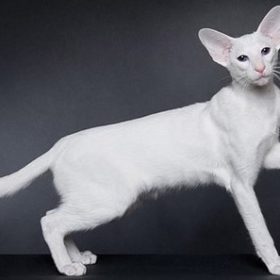 Foreign White
Foreign White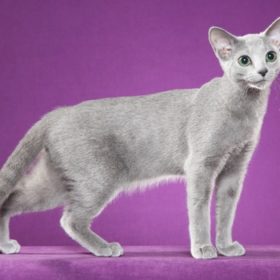 Russian Blue
Russian Blue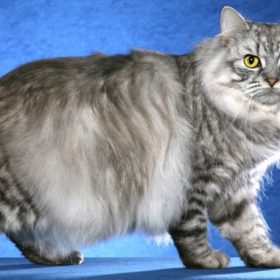 Cymric
Cymric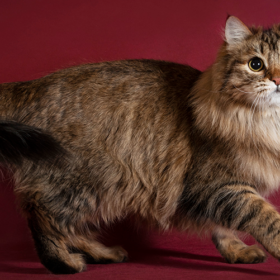 Siberian
Siberian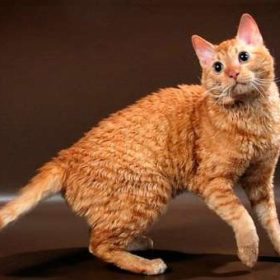 Ural Rex Shorthair
Ural Rex Shorthair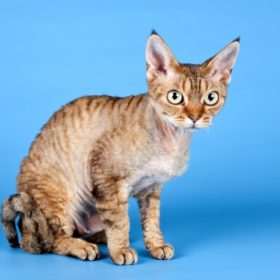 Devon Rex
Devon Rex